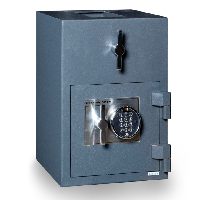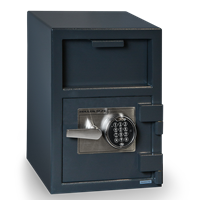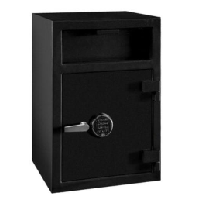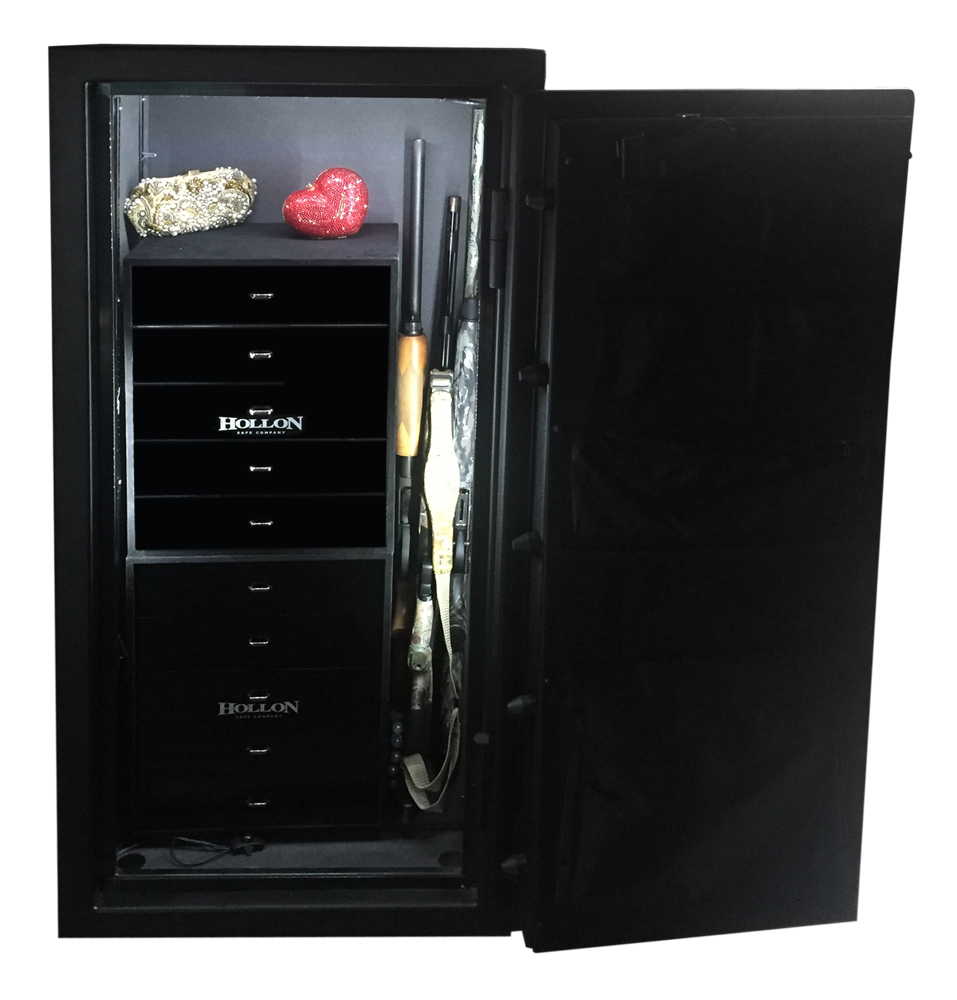About Our Safes
Types of Safes
Manufacturers produce safes in every size and for every purpose imaginable, rendering the search for the right one overwhelming. To aid in the research process, we have compiled a short guide. We divide safes into two broad categories—home and business/commercial—to make the search easier.
Home Safes
Usually fairly small when it comes to safes, home safes typically include a one hour fire-resistant rating. The fire-resistance and theft-resistance, though often lower in home safes, offers enough protection for most personal uses. Consumers find home safes attractive in pricing as well–size and slightly less security from theft and fire contribute to the lower price tag. Consumers can purchase wall safes or floor safes for the home depending on the importance of content accessibility. Often a wall safe offers more convenience. Attached to studs in the wall, wall safes can be secured in place with concrete for added security. Floor safes, bedded in concrete, prove to be very theft-resistant but can sometimes rust due to the placement below the floor. When considering a floor safe, keep this in mind and ask the salesperson about the wear and tear that will occur over time.
A gun safe, the ideal place to secure your firearms, is another common type of home safe. Designed to fit all sizes and types of guns, these safes come equipped with varying amounts of fire protection. If you simply want to protect your guns from theft or from getting into the hands of a child, then a less fire-resistant model will work fine. If you are looking for protection for your collection of valuable or irreplaceable guns, some models offer a higher degree of fire protection.
A gun safe, the ideal place to secure your firearms, is another common type of home safe. Designed to fit all sizes and types of guns, these safes come equipped with varying amounts of fire protection. If you simply want to protect your guns from theft or from getting into the hands of a child, then a less fire-resistant model will work fine. If you are looking for protection for your collection of valuable or irreplaceable guns, some models offer a higher degree of fire protection.
Business and Commercial Safes
Office safes, although similar to home safes, are equipped with more fire protection, more theft-resistance and are often larger than equivalent home models. In addition, manufacturers create office safes geared specifically towards business requirements. For instance, fire-proof filing cabinets offer a safe place to keep legal documents that must be protected from fire and theft while also remaining accessible for everyday office business.
Rotary hopper and front depository safes, specialized types of office safes, allow deposits into the safe without any security. Functioning like mailboxes, the safes afford a way for everyone to place a deposit but can only be opened by the individual who has the key or combination to unlock it. Since the safes contain openings for deposits, they do not protect the contents as well as other types of safes (note the bottom to “hopper” or depository distance in descriptions of these safes that indicate how easily one might access the contents without a key or code). Businesses with high volumes of cash coming in might use one of these safes during the day and transfer the money to a higher security safe or the bank at night.
A data safe, an important safe for businesses today, protects diskettes, CD’s and tapes from theft, and more importantly, fire damage. At temperatures above 150°F, electronic data is destroyed. Therefore, a normal fire-resistant safe that maintains internal temperatures of 350°F, fails to safeguard irreplaceable electronic data. Specialized safes for data storage maintain internal temperatures of 150°F or less during fire exposure of up to two hours (one hour for some models)and will preserve your important business data in case of fire.
The fire proof safe with security safe offers an additional level of support in the home or office. With a layer of fire protection as well as an additional safe inside for security against theft, the fire proof safe with security safe enables the consumer a unique level of security against burglary and fire damage. The safe allows two people to have access to the primary safe while maintaining more limited access to the inner safe if desired.
Hotel and dorm safes protect guests’ valuables from theft and, in some cases, fire. They are relatively inexpensive due to their small size and afford a great way to protect yourself or your guests from theft.
The consumer can also search for safes according to U.L. classifications that suit his needs. Simply look for safes offering fire resistance or theft-resistance consistent with your business or personal requirements. Exploring the options when it comes to buying a safe can be overwhelming, and often advice from an expert proves invaluable. Please feel free to contact us at Vault and Safe and we will help you through the process of choosing a safe.
Size
Many people want to know the difference between a vault and a safe—is one better than the other? The simple answer is no: vaults are just very big safes–think walk-in closet or “Ocean’s Eleven”-style casino vaults. Generally, a safe functions just fine for most personal uses and many of your business needs. How big should you go, however, is a different question.
If you have an expanding store of valuables such as a jewelry collection, you may want to consider a more sizable safe than currently fits your needs in order to accommodate for the future. A quality safe lasts a number of years, so taking into account how much room you will need in the years to come could prove worthwhile. Additionally, consider the inside of the safe and how the contents will be arranged—-in small compartments or on a few shelves, no drawers or several? Thinking in terms of space and internal configuration facilitates the decision-making process when it comes to buying a safe.
Locks
Mechanical combination locks offer the least expensive way to secure a safe and are usually more than adequate for home use. Electronic locks, however, afford some distinct advantages for business use. Electronic locks make changing the combination easier and can sometimes be programmed to deny the user entrance following too many wrong attempts. Consequently, a thief can not simply breeze through every combination, eventually gaining entrance. In addition, different users of an electronically-locked safe can have different combinations and the door of an electronically-locked safe automatically locks when closed–rather than with a turn of the dial. All of these advantages signify one goal: higher security for you and your business. To learn more see our friends at http://www.lsitraining.com/





